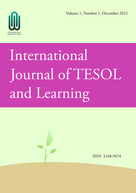


Volume 11 Issues 1-4 (2022-12-31)
Volume 10 Issues 3&4 (2021-12-31)
Volume 10 Issues 1&2 (2021-06-30)
Volume 9 Issues 3&4 (2020-12-31)
Volume 9 Issues 1&2 (2020-06-30)
Volume 7 Issues 3&4 (2018-12-31)
Volume 6 Issues 3&4 (2017-12-31)
Volume 6 Issues 1&2 (2017-06-30)
Volume 5 Issues 1&2 (2016-06-30)
The Editor-in-Chief is proud to announce the inaugural issue of International Journal of TESOL and Learning, published by Untested Ideas Research Center, Niagara Falls, New York, USA.
In order to succeed in English language programs, learners of English as a second language (ESL) must be able to read effectively in English, which includes reading at an efficient rate. The purposes of this research were (1) to determine whether the use of reading rate software increases the effective reading rate of ESL learners in a college English for Academic Purposes (EAP) program, and (2) to identify the ESL learners' views on the use of the software. Results indicate that effective reading rate improved in both traditionally taught reading classes and software-enhanced sections, but increases on average were greater in the software-enhanced classes. Students in the sections utilizing the software indicated that they felt somewhat more confident as readers and believed their own reading rate had increased as a result of using the software. Implications for the use of reading rate software are discussed in light of the findings.
This study investigates high school teacher perceptions about seating arrangements and their impact on student participation in the classroom from a North American perspective. Specifically, it examines high school teacher perceptions of how different seating arrangements affect student participation, motivation, and classroom interaction. Data were collected from both Canada and the United States of America. The research instrument used for this study is a survey containing nineteen 5-point Likert scale items. Results show that North American high school teachers recognize that seating arrangements do have an impact on students and their participation levels in the classroom. These teachers viewed student participation as being voluntary not mandatory. Further, the amount of participation appears to be more self-directed than enforced. Important implications for teachers and student are discussed.
This paper provides insights into the pragmatic aspects of language used in humor by explaining and interpreting humorous utterances in ESL classrooms. It specifically explores the types of speech acts that were used in the humor utterances. The participants in this study were four ESL lecturers in an ESL setting. Data comprised of classroom recordings, observations and field notes that were analyzed and coded qualitatively. The findings of this study suggest that the ESL lecturers’ humorous utterances were mostly informatives and that effective use of humor as a pedagogical tool can create and promote a positive learning environment.
Both theory and commonsense suggest that curriculum time for a subject is a critical factor of its effective learning. Curriculum designers compete for curriculum time for their subjects. Schools finding students not learning well enough mount programs after school to make good the deficit. Using PISA 2009 data for 65 participating nations, multiple regressions was run to investigate the contributions of time for curriculum and after-school to achievements in Reading, Mathematics, and Science. The results show curriculum time not related to differences in achievement as measured by the PISA Reading, Mathematics, and Science test. After-school enrichment lessons make a contribution to Reading, Mathematics, and Science achievements but negatively. Afterschool remedial lessons have a positive relation with Reading achievements. These are only for the OECD but not the Partner countries. The findings are discussed with reference to the processoriented nature of the PISA tests. Implications for curriculum designers and after-school programs are also discussed.
1ST Untested Ideas International Research Conference
June 28 – 30, 2013
Niagara Falls, USA
UI JOURNALS
With the goal of advancing research in the social sciences, Untested Ideas (UI)Research Center provides the researchers and scholars worldwide with resources,grants, and academic exchange platforms and channels through research interestgroups, memberships, funded research projects, annual conferences, trainingworkshops, and publications. The mission of UI Research Center is to serve the socialsciences researchers and scholars in the world and aim to promote advanced andcutting-edge research methodology, publish investigations on new and untested ideas,and disseminate res